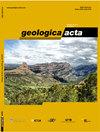Papôa火山角砾岩的花岗岩捕虏体揭示了中生代卢西塔尼亚盆地下方基底的年龄(西伊比利亚)
IF 2
4区 地球科学
Q2 GEOLOGY
引用次数: 1
摘要
横切西伊比利亚鲁西塔尼亚盆地下侏罗统层序的Papoa火山角砾岩岩脉含有花岗质捕虏体。本研究首次对两个包体进行了U-Th-Pb锆石分析,黑云母花岗岩的U-Th-Pb值为298±4 Ma,二云母花岗岩的U-Th-Pb值为292±2 Ma,表明卢西塔尼亚盆地前中生代基底包含二叠纪侵入岩。这些年龄与Berlengas岛晚石炭世花岗岩年龄与研究区西北部Farilhoes岛晚泥盆世高变质岩年龄的误差范围内接近,后者构成了卢西塔尼亚盆地前中生代基底。这些新的地质年代学发现使我们能够确定,在阿巴拉契亚-瓦里斯坎带的这个地区,二叠纪-石炭纪岩浆活动至少持续了13 Ma。此外,与位于伊比利亚地块内外的阿巴拉契亚-瓦里斯坎带古生代构造单元的现有资料进行比较,可以提出卢西塔尼亚盆地(Peniche)最有可能位于南葡萄牙带,该盆地也可能与英格兰西南部的雷诺西西带和新斯科舍省的Meguma地体相关。本文章由计算机程序翻译,如有差异,请以英文原文为准。
Age of the basement beneath the Mesozoic Lusitanian Basin revealed by granitic xenoliths from the Papôa volcanic breccia (West Iberia)
The dyke of the Papoa volcanic breccia cross-cutting the Lower Jurassic sequence of the Lusitanian Basin (West Iberia) contains granitic xenoliths. In this study, for the first time, U-Th-Pb zircon analysis of two xenoliths yielded 298 ± 4 Ma for biotite granite and of 292 ± 2 Ma for two-mica granite, indicating that the pre-Mesozoic basement of the Lusitanian Basin includes Permian intrusions. These ages are close within the margin of error of the age of the Late Carboniferous granites of the Berlengas isle that with the Late Devonian high-grade metamorphic rocks of the Farilhoes isles, located northwest of the study area, which form the pre-Mesozoic basement of the Lusitanian Basin. These new geochronological findings enable it to be established that Permo-Carboniferous magmatism lasted at least 13 Ma, in this region of the Appalachian-Variscan belt. Furthermore, a comparison with available data from Paleozoic tectonic units of the Appalachian-Variscan belt located both in the Iberian Massif and outside it enables the suggestion to be made that the Lusitanian Basin (Peniche) most probably rests on the South Portuguese Zone, which may also be correlated with the Rhenohercynian Zone present in southwest England, and the Meguma terrane of Nova Scotia.
求助全文
通过发布文献求助,成功后即可免费获取论文全文。
去求助
来源期刊

Geologica Acta
地学-地质学
CiteScore
2.50
自引率
6.70%
发文量
13
审稿时长
>12 weeks
期刊介绍:
- Relevant conceptual developments in any area of the Earth Sciences.
- Studies presenting regional synthesis.
- Thematic issues or monographic volumes presenting the results from one or more research groups.
- Short papers reflecting interesting results or works in progress.
- Contributions and results from Research Projects, Workshops, Symposiums, Congresses and any relevant scientific activity related to Earth Sciences.
- Geologica Acta aims to stimulate rapid diffusion of results and efficient exchange of ideas between the widespread communities of Earth Science researchers (with special emphasis on Latinamerica, the Caribbean, Europe, the Mediterranean
 求助内容:
求助内容: 应助结果提醒方式:
应助结果提醒方式:


